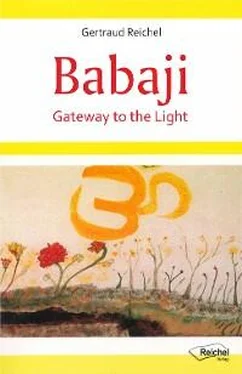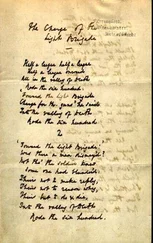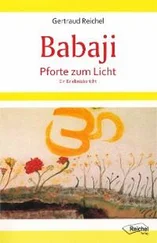The journey continued through the countryside, passing small villages and lakes. At times we could just glimpse the black heads of water-buffalo surface and disappear again. We were heading towards a monastery at Daknath. The priests had invited Babaji to visit them and, after receiving him warmly, led him and his entourage in a procession through the narrow streets of the town. They were going to a Shiva temple, where men only could enter, once they had bared the upper part of their bodies as an act of penance. The priests tried in vain to persuade Babaji to take off his shirt like a good pilgrim before proceeding down the narrow lane and entering the temple. The high priest was meeting Babaji for the first time and was unsure of his holiness. He insisted Babaji conform to temple rules. A long dispute followed during which something must have happened to change the high priest's heart and mind because he ended up with no alternative but to acknowledge Babaji as Mahavatar. Some days later he came to Calcutta and surrendered completely to Babaji.
We had all accompanied Babaji during the procession. It was not only his blue silk shirt that stood out in the procession; it was also the grace of his movements, flowing in perfect harmony with the environment. Once they had reached the temple the priests disappeared inside. Babaji lingered for a while before entering and I tried to catch up to him. I didn't know then that it was forbidden for foreigners to enter and was surprised when a priest tried to block my way. He could see I was a foreigner even though my face was covered by my saree.
I can't stand it when man-made rules and dogmas get in the way of the essential religious teachings. Why should a person following one religion or no religion at all, be barred from paying respects in the temple of another religion when the essential matter is sincerity of heart.
I said to the priest, "I am a Hindu, let me in!"
No reaction.
"Let me in, I am a Hindu!", I repeated.
Now Babaji intervened. He had been attentive when I said "I am a Hindu", and this made me examine my conscience. I was a Hindu, a Christian, a Jew and a Buddhist: it was true; I was all of these. Babaji then shouted "She's a Hindu", and waved that I be let through.
I tried again to pass by the priest but he wouldn't budge. Old rules and past conditioning held him captive, despite Babaji's presence. He stood there blocking the passage with his huge belly. I acted on impulse and pinched his huge protrusion hard.
"Ouch!", he cried in surprise. I bet he'd never experienced an attack like that before. Oh my God, his authority had been undermined!
In the meantime Babaji had disappeared inside the temple. This incident sparked several heated discussions about religion among Indian devotees and Hindu priests.
Babaji was constantly stressing the need for unity in all religions; that all faiths should flow into one large ocean and bring equality to all people everywhere. He did not recognise the restrictions imposed on account of creed, caste or race. In his ashram, untouchables sat side by side with Brahmins and worked together, mostly doing manual labour like building the fortifications against the monsoon floods. According to their tradition, Brahmins only eat food that is separately prepared for them, but with Babaji, they have to eat the same food as everyone else. Also everyone joined together for prayer. There were no separations here either.
Babaji was free and no man-made law could bind him. He had sovereign power over all the laws of nature and over the natural and elemental forces.
People have had many occasions to witness this power of his. For example, there was the time when a religious festival lasting several days was to be held outdoors, and just when it was due to begin, the rain cleared up and only started again when it was over. This was quite unusual as the heavy downpours during the monsoon season occurred daily without fail. When the river at Haidakhan swelled with the heavy rains but was yet to become a raging torrent, Babaji could easily cross the river barefoot and nobody who walked with him was ever in danger. And again, when unexpected visitors arrived at the ashram, the amount of food already prepared would increase miraculously to cater for them abundantly. Always it was the people who wanted to impose some rule or system or other onto the one beyond them all. Sometimes Babaji appeared to go along with them when their conditioning and belief system was too strong to let go of and their present consciousness couldn't yet allow a broader understanding to take place.
There was certainly no evidence of the equality of the sexes in India. Even in Haidakhan, a woman menstruating was forbidden to enter the temple precinct, had to eat alone away from the others, and at no time was supposed to go near Babaji. The woman was deemed unclean and might contaminate, so the temple and Babaji, the very one who was above all, needed to be protected from her. What a massive contradiction! Babaji of course broke these rules at his discretion and let a woman approach him.
***
In Calcutta, one day never resembled the next and one morning, shortly after sunrise, we visited a Kali temple with Babaji. This temple is situated in the old town centre and must be one of the most ancient and holy places in Calcutta.
A popular western Kali interpretation associates the black, long-tongued, all-devouring goddess with ghastly horror stories. But there is more to it than that.
The word 'kal' is masculine, and adding the 'i' makes it feminine. It has a two-fold meaning. The first is time or eternity, and the second is the colour black (representing the unmanifest): out of darkness comes forth light, the world of manifestation, and this creation then returns through death and dissolution back to darkness. All that exists is afraid of its ending and therefore Kali, the Black, is pictured as being frightening. Beyond death and annihilation, eternity rules and only that which is eternal can give lasting happiness and joy. The widespread worship of Kali is understood in India as being the worship of one aspect of Divine Oneness. This is also true in regard to other deities in the Indian pantheon.
The Kali temple was so overcrowded it was impossible to enter. There was a tiny door opposite the statue and we were able to peek in. Our eyes turned to Babaji who stood like a rock in the middle of the writhing melee of bodies pushing and shoving towards Kali. He signalled us to climb through the small opening and reach him that way. For some time we gazed in silence at the statue. She appeared to have been there forever, unaffected by the dizzy world around her. A strong vibration radiated between Babaji and the statue which made me feel faint. Babaji then held out his arm to help us climb out again. When we got back to the house, there were hundreds of people waiting for Babaji, all waiting to receive his darshan.
I sat down and looked on as each person approached Babaji and received his blessings. At one point, I noticed a German man, who apparently had just arrived, handing Babaji some kind of folder. Babaji took a cursory look, closed it, and called out my name.
"This is a manuscript, read it and tell me what it contains."
Back in my seat I opened the file and read some short passages. Tears started to stream down my face. Here was a soul opening to God. The pain of loneliness, the long search and finally bliss at reaching his goal; it was overwhelming. All fell silent within me. I was struck by awe and gratitude for a deeper realization of what it means to come into the presence of Babaji. It opened my heart. I looked to Babaji who had apparently been observing me. He smiled at me and nodded. What the manuscript contained was not so important. Important was the author's inner unfolding. When I later had the opportunity to read it through thoroughly, it had the same effect. The author wanted to know what I thought:
Читать дальше












